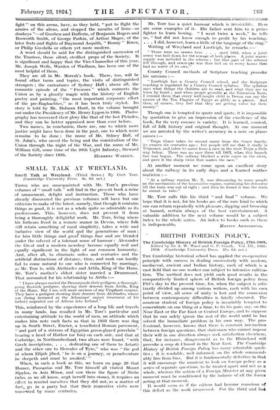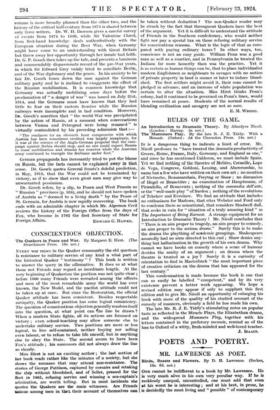BRITISH FOREIGN POLICY.
THE Cambridge historical school has applied the co-operative principle with success in dealing successively with modern, mediaeval, ancient and Indian history, each of which is a vast field-that no one worker can subject to intensive cultiva- tion. The method does not yield such good results in the comparatively limited sphere of British foreign policy from Pitt's day to the present time, for, when the subject is arbi-
trarily divided up among various writers, each with his own point of view, all sense of unity is lost and the connexion
between contemporary difficulties is fatally obscured. The amateur student of foreign policy is invariably tempted to concentrate on one thing at a time, to fix his gaze, say, on the Near East or the Far East or Central Europe, and to suppose that he can safely ignore the rest of the world until he has
Solved the immediate problem in his own way. The pro- fessional, however, knows that there is constant interaction between foreign questions, that statesmen who cannot impose their will in one direction always seek satisfaction elsewhere, that, for instance, disagreement as to the Rhineland will provoke a coup de Chnnak in the Near East. The Cambridge History of British Foreign Policy has many admirable quali- ties ; it is readable, well informed, on the whole commend- ably free from bias. But it is fundamentally defective in that
it will encourage the amateur to look on foreign policy as a series of separate questions, to be treated apart and not as a whole, whereas the action of a Foreign Minister at any given moment must be conditioned by the balance of all the forces
acting at that moment.
It would seem as if the editors had become conscious of
this defect as the work progressed. For the third and last volume is more broadly planned than the other two, and the history of the critical half-century from 1874 is shared between only three writers. Dr. W. H. Dawson gives a careful survey of events from 1874 to 1899, while Sir Valentine Chirol, from first-hand knowledge, deals authoritatively with the European situation during the Boer War, when Germany might have come to an understanding with Great Britain but threw away her opportunity through her innate bad faith. Dr. G. P. Gooch then takes up the tale, and presents a luminous and commendably dispassionate record of the pre-War years, in which Sir Edward Grey vainly tried to conciliate Berlin, and of the War diplomacy and the peace. In his anxiety to be fair Dr. Gooch tones down the case against the German military party and he is inclined to exaggerate the effect of the Russian mobilization. It is common knowledge that Germany was actually mobilizing some days before the proclamation of " a danger of war " was issued on July 31st, 1914, and the Germans must have known that they had little to fear on their eastern frontier while the Russian railways were incomplete and in bad condition. Moreover, Dr. Gooch's assertion that " the world War was precipitated by the action of Russia, at a moment when conversations between Vienna and Petrograd were being resumed " is virtually contradicted by his preceding admission that :-
"The readiness for an eleventh hour compromise with which Austria has been sometimes credited was largely imaginary, for it was of the essence of the Anglo-German proposal that the cam- paign against Serbia should stop, and no one could expect Russia to cease mobilization and dismiss her reserves while the Austrian army continued to trample the Serbians under foot."
German propaganda has incessantly tried to put the blame
on Russia, but the facts cannot be explained away in that
sense. Dr. Gooch. quotes General Smuts's doleful prediction, in May, 1918, that the War could not be terminated by victory, as if to show that even great men may give way to unwarranted pessimism.
Dr. Gooch refers, by a slip, to Posen and West Prussia as " Russian " provinces (p. 534), and he should not have spoken of Austria as " doomed to a living death " by the Peace of St. Germain, for Austria is now rapidly recovering. The book ends with an admirable chapter in which Mr. Algernon Cecil reviews the history of the Foreign Office from the days of Fox, who became in 1782 the first Secretary of State for











































 Previous page
Previous page